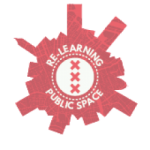An Action Research Event
When: 28th – 30th June, 2018
Where: AMS Institute, Mauritskade 62, 1092 AD Amsterdam

Urban researchers, planners, communication experts, geographers, architects, as well as active citizens, policy makers trace the stories behind contemporary appropriations of public space. They identify related dilemmas and formulate research questions by liaison with locals, designing an alternative city guide inspired by a set of broad, yet timely themes: The ludic team focusses on the affordance of creative reuse an play in the city, grounded in co-creating public space. The circularity team focusses on self-sufficiency in the city, as manifested by places of gathering and sharing and tangible in productive urban landscapes. The informal team focusses on emerging inequalities and politicisation/de-politicisation, as a result of global commons and local governances of urban places. The wild life team shifts focus to the place of animals in our city. The mass tourism team shines the light on the effect of visitors, travelers, and short-stay residents on the public sphere.
In every team, participants dwell on specific challenges locals are confronted with, and the interventions they envision as potentially enriching the city. When presented with the opportunity to consult a broad, experienced and interested audience, what are the questions they would like to raise? The resulting city guide will enable the event participants to experience local everyday practices through thematic tours, which present alternative narratives of the city.
The aim of the alternative city guide is to question empowerment and ownership: – of public space, and – of the knowledge fields on public space. The event challenges the traditional academic conference format – rather than having a series of paper presentations, participants will learn, and use their research and daily experiences to reflect on the main challenges that underpin the thematic routes.
During the thematic tours, targeted interventions and exercises co-designed with local participants provide opportunities for debate and reflection. How do these interventions ‘perform the place’ and alter/disrupt/enhance relationships? The combination of activities shed light on questions of learning, ownership and empowerment, as well as setting the scene for future explorations and revisions of the alternative city guide. Here, public space is playground in a broad sense – we learn and reflect by seeking connections with locally active people and designed objects not just as ‘quick’ passers-by, but as observers and participants, and by conducting ‘action research’. The explorations performed during the conference aim to unpack the complex character of current and emergent urban challenges, to address those challenges both within community forums and plenary sessions, and to enable further learning and collaborative projects through the use of an open access data platform.
The event is part of the AESOP series Unstable Geographies, Dislocated Publics of the AESOP Thematic Group Public Space and Urban Cultures. AESOP is a European network of researchers, teachers and practitioners in the field of planning and design.
Event website The Urban Public (temporary)
The Association of European Schools of Planning – AESOP website
Advanced Metropolitan Solutions (AMS) Institute
Wageningen University & Research



